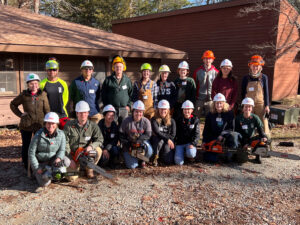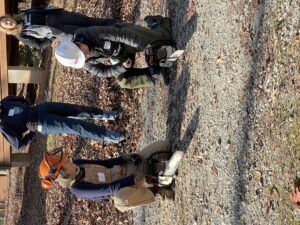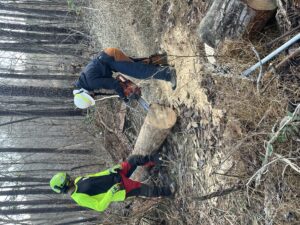Our Recent FER Chainsaw Safety Course
go.ncsu.edu/readext?906435
en Español / em Português
El inglés es el idioma de control de esta página. En la medida en que haya algún conflicto entre la traducción al inglés y la traducción, el inglés prevalece.
Al hacer clic en el enlace de traducción se activa un servicio de traducción gratuito para convertir la página al español. Al igual que con cualquier traducción por Internet, la conversión no es sensible al contexto y puede que no traduzca el texto en su significado original. NC State Extension no garantiza la exactitud del texto traducido. Por favor, tenga en cuenta que algunas aplicaciones y/o servicios pueden no funcionar como se espera cuando se traducen.
Português
Inglês é o idioma de controle desta página. Na medida que haja algum conflito entre o texto original em Inglês e a tradução, o Inglês prevalece.
Ao clicar no link de tradução, um serviço gratuito de tradução será ativado para converter a página para o Português. Como em qualquer tradução pela internet, a conversão não é sensivel ao contexto e pode não ocorrer a tradução para o significado orginal. O serviço de Extensão da Carolina do Norte (NC State Extension) não garante a exatidão do texto traduzido. Por favor, observe que algumas funções ou serviços podem não funcionar como esperado após a tradução.
English
English is the controlling language of this page. To the extent there is any conflict between the English text and the translation, English controls.
Clicking on the translation link activates a free translation service to convert the page to Spanish. As with any Internet translation, the conversion is not context-sensitive and may not translate the text to its original meaning. NC State Extension does not guarantee the accuracy of the translated text. Please note that some applications and/or services may not function as expected when translated.
Collapse ▲We recently offered a Basic Chainsaw Safety Course at the Hill Forest on December 2, 2022. The day-long workshop was supported by the Department of Forestry and Environmental Resources Enhancement Fund. Open to all students, staff, and faculty within the department, the goal was to provide departmental members an opportunity to learn about the safe operation of chainsaws and provide opportunities to hone and practice skills. Over half of the participants had never used or handled a chainsaw previously, and others attended as a refresher or to increase the safe use of equipment by themselves or team members.

Group photo of Basic Chainsaw Safety Course participants.
Eighteen participants joined the workshop with the majority of participants being undergraduate and graduate students. Outcomes of the workshop were positive with 47% of participants rating their understanding of basic chainsaw topics low to very low before the workshop and only 1% rated low to very low after the workshop. Participant satisfaction of the workshop was high with comments like, “This workshop was fantastic! I had never used a chainsaw before and now feel very comfortable using them.” and “This course was very insightful, even considering that I have some chainsaw experience. After I completed this workshop I felt more confident in assessing trees for felling and with operating and maintaining a chainsaw.”

Liz Snider, Woodlands Restoration LLC, instructs participant on how to start a saw.
The day included classroom instruction on personal protection equipment, introducing parts of the chainsaw, and safe use. Instruction continued outside with discussion of felling trees and assessing hazards, basic chainsaw maintenance, and starting and using a chainsaw. The lead instructor was Joe Mattox, Safe Steps, with Liz Snider, Woodlands Restoration LLC, and Elliot Nauert, NCSU Extension Forestry, who assisted with instruction throughout the day.

Lead instructor Joe Mattox, Safe Steps, instructs participant on using a saw to cut a tree cookie.
NC State Extension Forestry has previously offered five woman-focused chainsaw safety courses since 2019 at locations around the state. Management activities on forested properties often include using chainsaws, which require training to operate safely. Additionally, storm damage from hurricanes or ice storms can lead to clean-up challenges for many property owners as they work to remove downed timber and debris. While chainsaw safety courses are occasionally offered in North Carolina, women may not attend conventional landowner programming because they feel that it is not directed to them. We are extremely grateful to a great team of instructors and partners that continue to make these workshops possible.
NC State Extension Forestry will be hosting more women-focused chainsaw workshops in 2023 with partners across the state. Stay tuned!


